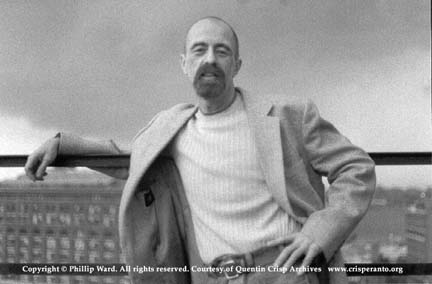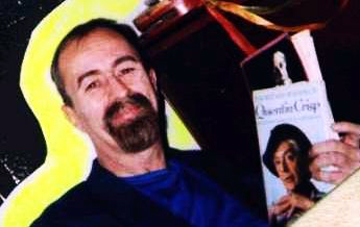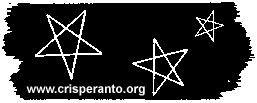
|
"ALL YOU HAVE TO WEAR ..."
Quentin Crisp's Legacy by Guy Kettelhack |
| Sometime back in the early ’80s—1983, ’84?—I remember walking Quentin Crisp home, down Second Avenue from St. Mark’s Place to East 3rd Street. We’d almost reached his corner when some drunken lout shouted from across Second Avenue, "Hey, faggot! Suck my…" and—well, more in that vein. Quentin furrowed his brow and recited his now famous reply to all such jeers: "Oh dear—we seem to have annoyed that gentleman in some way." At the time this seemed to me just one more rote response—one more "Crispism" you could reliably expect from Quentin under certain predictable circumstances or conditions. (Akin to his invariable response—"Oh, I’ve gone on living, in spite of everything"—to the small-talk query "How are you?") As much as Quentin Crisp very genuinely believed that "in America, everyone who isn’t hitting you over the head is your friend," he did—even in his beloved Manhattan—have to deal with various unpalatable people "hitting him over the head." He never complained about this—or rather, he never spoke of it to anyone he didn’t think might be able in some way to shield him from these occasional unfortunate encounters. In the early ’80s, Quentin was stalked by at least two disturbed young women at disparate times—each of whom would wait for him to emerge from his rooming house and in various ways harass him (yell, plead, shove notes into his hand, threaten to hurt him) or call him at all hours of night and day. As one of his literary agents at Connie Clausen Associates—and, perhaps more to the point, as his near-neighbor (I lived in the East Village then)—I was one of the rare people to whom he confessed his distress over these occasional assaults. I suppose he knew I might (walking him home from various dog-and-pony promotional parties, lunches, doctor’s appointments, etc.) at least act as occasional bodyguard—at these times, anyway, there would be less likelihood of being actually physically bludgeoned by one of these screaming harridans. But mainly he just waited for the crazed women to tire of inflicting their unwelcome attentions—while he behaved, as he also always said he tried to behave (on his birthday, for example), "as if nothing unpleasant had happened." This laissez-faire stance served him well enough: crazy people do tend to burn themselves out over time (as Quentin knew from his own vast personal experience of having known so many of them). I recount all this now not to paint a depressing picture of Quentin’s life in New York—fortunately, these "unpalatable" people were very much the minority in his largely very happy life here. But now, a year-and-a-half after his departure from Planet Earth, I hear something quite different—even startling—in the echo of his "Crispisms," his invariable responses to the inevitable day-to-day insults and difficulties he faced. Now, they no longer seem "rote"—unthinking. I hear an innocence in them—something childlike. I hear genuine bewilderment at his finding out, once again, that people chose to behave unkindly—not just toward him, but toward each other. This "innocence" of Quentin Crisp became clearer to me recently when, asking a friend (an "out" gay man) who had only seen Quentin in a couple videos (the movie "Resident Alien" and his one-man-show "An Evening With Quentin Crisp") what his impressions were, I was struck by how much wince there was in his reply: "What a flaming old queen!" he muttered, all but jumping back from me (as if I were Quentin). I flashed back to 1984 when I showed my father the cover of the just-published Harper edition of The Wit & Wisdom of Quentin Crisp (the anthology I was privileged to produce with him)—a large purple trade paperback featuring a glamorous black-and-white portrait (Quentin looked a bit like Katharine Cornell) by the well-known New Orleans photographer George Dureau. My father similarly jumped back from it—an involuntary reflex, a somatic aversion to "the thing." Clearly this had to do with deeply entrenched assumptions about "gender" which Quentin—to so many people, but mostly men—evidently violated too blatantly to be tolerated. But what hit me upside the head now, this latest time (hearing my friend describe Quentin as a flaming queen before all else), was my realization that I had never found Quentin effeminate. I mean never. From the moment I met him in the office of his literary agency, Connie Clausen Associates—through years of seeing him in social and professional venues of every bewildering stripe—he never once seemed "effeminate" to me. Now I have nothing against effeminacy. ("Some of my best friends…," etc.) But there was something so—authentic is the word that comes to mind—something so singular about Quentin, that to me he transcended all categories, even the ones that seemed so obvious to so many others. Frankly, this made me feel a little stupid. The first reaction of very nearly everyone I talked to who knew who Quentin was (from his work or his reputation) was some species of "What a flaming old queen!" What was I missing? Was my blindness to Quentin’s alleged effeminacy some psychological defense against my own unconscious aversion to it? No. Because when I "feel" what Quentin’s real legacy to me is—something I’m somehow more able to "feel" after his death—it has to do with what I’ve called his "innocence." I believe Quentin Crisp truly didn’t understand that he or anyone else had the choice to be anyone other than himself. There was genuine bewilderment in him about other people who seemed to believe that they did have this choice. For one thing, we were all so bad at it. How many of his quips had to do with pig farmers wanting to be ballerinas, or "leathermen" who (despite holding their biker helmets under their arms) "came by bus": Quentin didn’t understand why anyone thought he or she could cover up his or her "selfness," soul, idiosyncratic reality. It was the most obvious thing in the world to him: who we really were. It struck him as the height of folly to believe we could hide our own true flames of self. Anyway, why—since they were the only currency we had to barter with—would we want to? Being with him—as I had the privilege of doing over a good many years—had had an instantaneous domino effect on me: I "got" his idiosyncrasy, his uniqueness, his Quentin-ness—the experience of being with him for some reason freed me from having to see him as any sort of "category" (queen, old man, British, etc.). I do not take credit for this ability: it was and is an automatic response, once again, to having been with the man—a kind of spontaneous reaction to him. ("Ah! He is so completely himself. Maybe I can be who I am.") He was Quentin—preeminently. He was not a sad, lonely, old queen; or a latter-day version of Oscar Wilde; or anyone’s sweet elderly maiden aunt. He was what he said and how he behaved. You didn’t know Quentin (I believe) if you didn’t know him "in the moment." And it was and is "in the moment" that he beckoned us also to live. He did this because he knew that was the only experience of freedom we were likely to know. He’d found  freedom this way—he wanted us to find it, too. freedom this way—he wanted us to find it, too.This is the freedom he bestows on me now. I am taught by his example to mistrust categories. At best, they give you a kind of blunt initial ability to sort things out—yellow goes here, blue goes there, round here, square there. But the real truth about anything—or anyone—requires a very different and very much closer attention, encounter. How do we prepare for this encounter? Couldn’t be more simple. In his words: "All you have to wear are your wonderful, wonderful selves." To read other QCA articles written by Guy Kettelhack, click Ancient, Glittering & Gay and The Enigma of Denis Pratt. Read his article at NightCharm. Also read Mr. Kettelhack's contribution to "A Centennial Celebration" for Quentin Crisp here |

